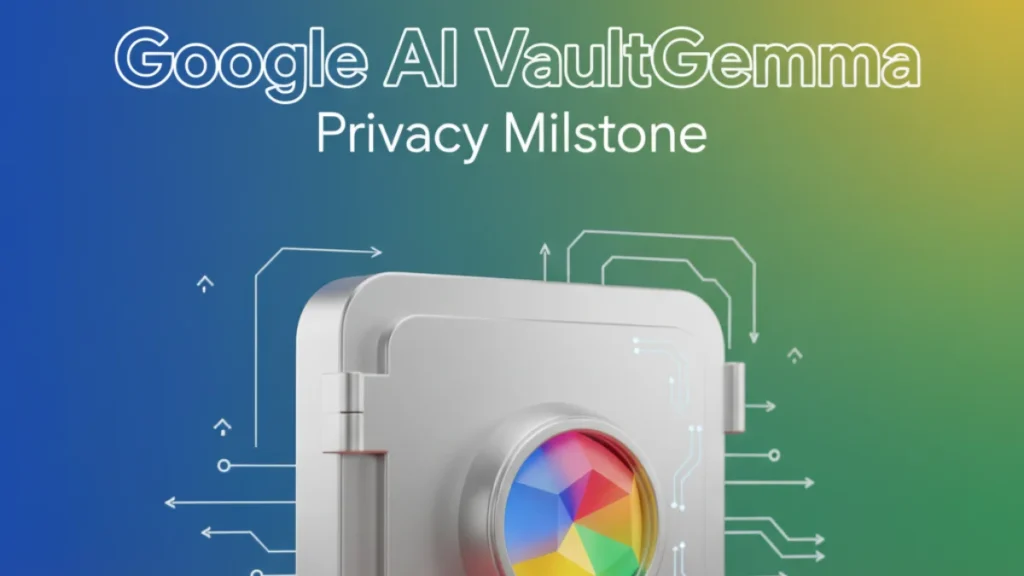Google has just unveiled VaultGemma, a one-billion parameter AI model built from scratch with full differential privacy — the first of its kind at this scale.
The release marks a turning point in AI: a system that can rival past open models while guaranteeing no sensitive data leaks. But while privacy takes center stage, trade-offs in performance remain.
Key Takeaways
- Google launches VaultGemma, a 1B-parameter AI trained with full privacy.
- Differential privacy blocks data leaks from training sets.
- Benchmarks show weaker results than non-private peers.
- Release sets new standard for safe open-weight models.
VaultGemma is Google AI’s largest open-weight language model trained entirely with differential privacy. With one billion parameters and rigorous privacy guarantees, it prevents sensitive data leakage during inference. While it lags behind non-private models on benchmarks, VaultGemma proves large AI can be both powerful and privacy-preserving.
Google Pushes Privacy to the Forefront
Google AI and DeepMind have unveiled VaultGemma 1B, the largest open-weight model trained under strict differential privacy (DP). The release is significant not just for size — one billion parameters across 26 layers — but for proving that large-scale AI can be trained without memorizing sensitive user data.
Why Differential Privacy Matters
Traditional language models, trained on massive internet data, risk “memorization attacks” where personal details resurface. VaultGemma tackles this by injecting controlled randomness into every training step. Instead of memorizing raw data like phone numbers or emails, the model learns general patterns while scrubbing sensitive specifics.
This shift makes VaultGemma a potential template for how future AI systems might balance utility and user safety.
Inside VaultGemma’s Architecture
VaultGemma sticks to the familiar transformer blueprint but with tweaks for privacy efficiency:
- 1B parameters, 26 decoder-only layers
- GeGLU activations with a feedforward dimension of 13,824
- Multi-Query Attention capped at 1,024 tokens
- SentencePiece tokenizer with a 256K vocabulary
By reducing sequence length, Google made training under DP constraints less computationally demanding.
Training Data and Safeguards
The model ingested a 13-trillion token dataset, the same corpus used for Gemma 2, spanning English text, code, and scientific articles. Before training, Google filtered unsafe content, removed personal data, and scrubbed evaluation overlap to keep results fair.
How the Privacy Layer Works
VaultGemma relied on Differentially Private Stochastic Gradient Descent (DP-SGD), enhanced with:
- Vectorized gradient clipping
- Gaussian noise addition
- Truncated Poisson subsampling
- Gradient accumulation for batch simulation
The result: a provable DP guarantee of (ε ≤ 2.0, δ ≤ 1.1e−10) at the 1,024-token level.
Training at Scale
Google trained the model on 2,048 TPUv6e chips using partitioned GSPMD strategies. Each iteration processed ~518K tokens, repeated across 100,000 training steps. Despite DP constraints, performance closely matched scaling law predictions, staying within 1% of projected loss values.
How It Stacks Up in Performance
VaultGemma lags behind non-private contemporaries. On benchmarks:
- ARC-C: 26.45 vs. 38.31 (Gemma-3 1B)
- PIQA: 68.0 vs. 70.51 (GPT-2 1.5B)
- TriviaQA (5-shot): 11.24 vs. 39.75 (Gemma-3 1B)
That places its utility closer to non-private models from five years ago. But crucially, memorization tests found no leakage — unlike its non-private sibling Gemma.
The Bigger Picture
VaultGemma isn’t just another model drop. It signals a strategic pivot in AI development: proving privacy guarantees can be baked into foundation training, not bolted on during fine-tuning.
This has implications for:
- Healthcare AI — models trained on patient records without privacy risks.
- Finance — systems analyzing sensitive transactions securely.
- Consumer AI — chatbots or copilots that don’t risk leaking personal data.
Industry Response
While rivals like OpenAI and Anthropic tout safety features, Google’s VaultGemma shows mathematical privacy guarantees at scale. Early commentary in the AI research community frames it as a “proof-of-concept milestone”, though not yet competitive for state-of-the-art benchmarks.
What Happens Next
Google has released weights and training methodology openly, inviting researchers to experiment and build on VaultGemma. Expect further iterations where performance gaps narrow while privacy guarantees remain intact.
Conclusion
VaultGemma is less about raw performance and more about rewriting the playbook: AI models can be large, open, and provably private. For now, the trade-off is accuracy — but the precedent is clear. Privacy-preserving AI is no longer theoretical; it’s here.
